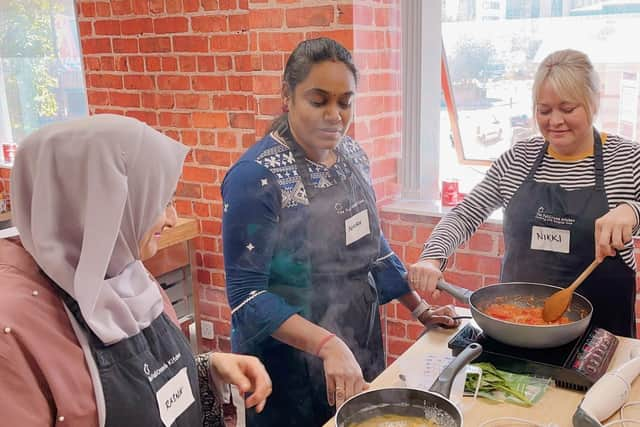FareShare Yorkshire: How charity is helping to feed thousands in need in Yorkshire whilst tackling food waste
There have been times when children as young as two or three have cheered at the sight of food items packaged in a box, grateful to be one of the families on the receiving end of a food parcel.
A heartbreaking observation from Norfolk Community Primary School in Sheffield, where packages are handed out to some of the community’s most vulnerable families. But it’s far from the only place where there’s a need for food.
Advertisement
Hide AdAdvertisement
Hide AdAt PAFRAS Leeds (Positive Action for Refugees and Asylum Seekers), up to 80 food parcels are given out each week to individuals and families living in a state of destitution. Over at Russell Hall Primary School in Bradford, meanwhile, the cost-of-living crisis is leading to more and more families making use of a food pantry service, leaving with bags of ingredients to create nutritious food for children.


All of these schemes – and several hundred more – are supported by FareShare Yorkshire, a charitable operation fighting hunger, food insecurity issues and food waste. Working in partnership with the UK’s largest food charity FareShare, the organisation was founded in 1998 to help tackle food poverty issues across the region and works by redistributing surplus food which would otherwise have gone to waste.
“We talk about turning an environmental problem into a social solution,” says Gareth Batty, chief executive of FareShare Yorkshire for the past decade. “We’re both a social impact charity and also an environmental charity. We’re marrying the two together. By intercepting surplus food, we’re reducing C02 emissions so there’s a huge environmental benefit to not allowing that food to go to waste, but also we’re making the best use of that food, getting it to individuals and organisations to do what the food was produced to do - feed people.”
This month marks 25 years since FareShare Yorkshire began. In that time, a small team of staff and volunteers have grown the charity so that today it helps to feed up to 35,000 people across the region each week. Each year, FareShare Yorkshire intercepts around 2,000 tonnes of surplus food from the likes of manufacturers, farmers, supermarkets and the hospitality sector, collating the produce in its three warehouses in Leeds and Barnsley for redistribution.
Advertisement
Hide AdAdvertisement
Hide AdAround 400 charities, schools, community groups and projects then receive a range of fresh, chilled and frozen products to use in food parcels or to transform into nutritious meals for those in need – four times the number of organisations to benefit than when Gareth started back in 2013. In the past year alone, that food contributed to around four million meals.


The charity also uses its warehouses and equipment to deliver accredited employability training to support people into work and three years ago, launched a cookery school, supporting beneficiaries to get the best use out of the food they receive.
“Unfortunately we’ve had to grow because of the level of need from the number of charities we work with,” reflects Gareth, who was awarded an MBE for services to the charity sector in the 2022 Queen’s New Year Honours. “We’re constantly getting more and more approaches for support around food from lots of different types of organisations but predominantly around families.”
When Gareth first joined the charity, from a background in banking and the social housing sector, the majority of the community services it supported with food were ones that cooked and provided meals on site. “That switched massively during the pandemic when all social eating settings closed pretty much overnight,” he says. “Our model had to change considerably to supporting organisations providing food parcels.
Advertisement
Hide AdAdvertisement
Hide Ad"That’s still a high percentage of what we do but more organisations now are trying to get back to social eating and creating impact through a meal. And that really matches up with the type of surplus food we’re able to source from the industry.”
As CEO, Gareth, from Sheffield, has overall responsibility for the leadership, management and strategic direction of the charity. He was recently recognised as the Judy Bell Yorkshire Food Hero at the Deliciously Yorkshire Taste Awards celebrating Yorkshire’s food and drink industry. The award noted the charity’s “invaluable” work, particularly during the Covid-19 pandemic and cost-of-living crisis, in “making a sustained difference to people’s lives”.
“Food is a basic requirement and is very powerful not just in terms of the calories it provides but the amount of connection and community it can create,” Gareth says. “Food should be enjoyed by everyone and something I said at the Taste Awards was that it was great to celebrate all these local producers making stunning food and my vision is that everybody in Yorkshire has the opportunity to experience that food.”
In the current climate, with the cost of living high, Gareth says working families, in particular, are struggling. More individuals are reaching out to organisations for support, some of those who probably wouldn’t have done so before. The result is that more charities and community groups are requesting more food.
Advertisement
Hide AdAdvertisement
Hide AdA complex picture, the crisis is also affecting the food industry. “There’s been a tightening of belts,” Gareth says, “and from an environmental angle, that’s fantastic because less food is being wasted because it’s being monitored more closely, but at the same time there’s a rise in a demand.”
“We will respond to need, we will intercept more food,” he continues. “But also we need to be having conversations about how we reduce the [scale of] need [for food] and also the amount of food wasted in the first place...We are not doing our charities and communities justice if we don’t reflect the issues people are facing to those who have the opportunity to make a difference [at a local and national level].”
- Visit fareshareyorkshire.org
